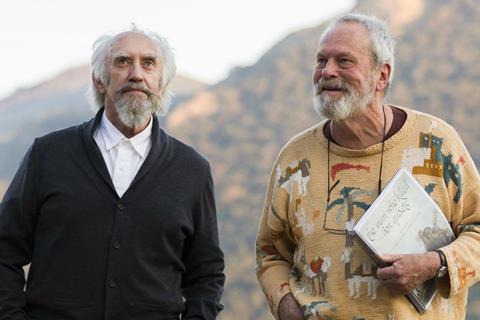
The Cannes Film Festival has released a strongly-worded statement criticising producer Paulo Branco, who is seeking an injunction against the festival in a bid to halt the screening of The Man Who Killed Don Quixote.
Terry Gilliam’s long-gestating project is currently scheduled to close the 71st edition of Cannes on May 19. However the film is embroiled in a legal rights battle between Branco and Gilliam, with a hearing related to the Cannes Film Festival Screening set to take place on May 7.
The Cannes statement, signed by president Pierre Lescure and general delegate Thierry Frémaux, is critical of Branco. It expresses “bemusement” at his actions, and suggests that: “Our entire profession knows that “forcing matters” has always been Mr Branco’s favourite method.”
It adds: “The trouble [was] caused on this last occasion by the actions of a producer who has shown his true colours once and for all during this episode and who has threatened us, via his lawyer, with a “humiliating defeat”.”
Read the full statement below.
Don’t miss out. Subscribe from as little as £2.35 a week with our Cannes Film Festival offer and receive unlimited online access.
On April 25, Paulo Branco and his production company Alfama Films took legal action aimed at preventing the planned screening of Terry Gilliam’s The Man Who Killed Don Quixote on Saturday, May 19 at the closing event of the 2018 Festival de Cannes.
The legal application will be considered at an urgent hearing next Monday, May 7: the day before the Festival opens.
As Mr Branco has so far been very prominent in the media and legal spheres it seems necessary to state the reasons which led us to choose the film and risk action by the producer, whose lawyer, Juan Branco, likes to point out that his image and his credibility are essentially built on his numerous appearances at Cannes and by his closeness to the great auteurs honoured by the Festival. The latter is true, which adds to our bemusement.
During the winter, just as The Man Who Killed Don Quixote was presented to us by Terry Gilliam, by the sales company Kinology Films and by the distributor Océan Films, Mr Branco informed us of his legal action against the director, following the breakdown of relations between them after the film’s pre-production.
Such legal disputes are not unusual. The Festival is regularly informed of them, but it is not in its remit to take a position on these sorts of matters. Therefore, after careful consideration and because it seemed possible the film would be released at the same time, we decided to feature this work in the Official Selection.
The Festival de Cannes’ mission is to choose works purely on artistic grounds and the selection must, above all, be with the agreement of the film’s director. This is the case here. Past experience had made us aware of possible legal action and of the risks we were running, but as it happens, when we took our decision, there was no opposition to the screening of the film at the Festival.
We therefore did not act carelessly or in any way “force matters” as Mr Juan Branco has said in the press. Our entire profession knows that “forcing matters” has always been Mr Branco’s favourite method, and we should recall that he organised a press conference a few years ago where he denounced the Festival de Cannes because it had not kept a “promise to select” one of his films. This was an accusation which didn’t go anywhere, because the Festival does not make promises to select films: it either selects them or it does not. Today, Mr Branco has allowed his lawyer to use intimidation and defamatory statements, as derisory as they are ridiculous, one of which targets the former President of an event which he has made use of throughout his career to establish his own reputation.
The Festival de Cannes will respect the legal decision, whatever it may be, but we strongly affirm that we stand squarely on the side of filmmakers and in particular on the side of Terry Gilliam. We know how important this project, which has gone through so many trials and tribulations, is to him. The trouble were caused on this last occasion by the actions of a producer who has shown his true colours once and for all during this episode and who has threatened us, via his lawyer, with a “humiliating defeat”.
Defeat would be to succumb to threats. At a time when two filmmakers invited to take part in the Official Selection are under house arrest in their own countries, at a time when Wanuri Kahiu’s film Rafiki, which is part of the Official Selection, has just been struck by censorship in Kenya, the country where it was produced, it is more important than ever to remember that artists need us to support them, not attack them. That has always been the tradition of the Festival de Cannes and so it will remain.
The screening at the closing event of the Festival is subject to the decision of the judge at the hearing on May 7. The release of 300 copies of the film in France is currently scheduled for Saturday, May 19.
The Festival de Cannes calmly awaits the court’s decision.
Pierre Lescure, President, & Thierry Frémaux, General Delegate.






![The Brightest SunScreen[Courtesy HKIFF]](https://d1nslcd7m2225b.cloudfront.net/Pictures/274x183/3/5/0/1448350_thebrightestsunscreencourtesyhkiff_312678.jpg)


















No comments yet